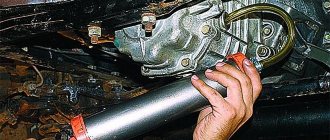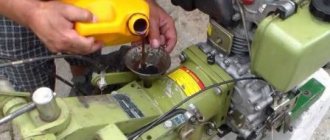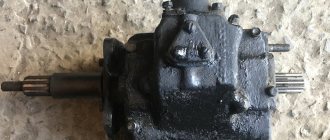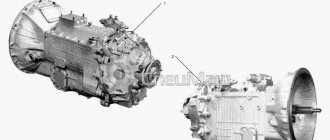What is the best oil to put in a forklift?
The operating manual for any equipment gives recommendations on choosing the brand of lubricating fluids. Here you can find out what kind of oil is poured into the engine, gearbox and other components of the loader. The manufacturer provides complete information on recommended technical fluids, suitable oils, and maintenance rules. Changing the oil is a mandatory procedure during maintenance. Before pouring new fluid into the system, it is necessary to study its properties, composition, characteristics and other important indicators. To avoid mistakes, it is best to entrust this operation to experienced mechanics at specialized service centers.
Modifications of AMKODOR-352
Currently, the AMKODOR line includes four machines with index 352: the model discussed in the review, which is positioned as a single-bucket front loader; AMKODOR-352S - on the manufacturer’s website located in the “universal loaders” section; AMKODOR-352L is a machine adapted for use in the forestry industry; AMKODOR-352S-02 - used for compacting haylage. In addition, modification AMKODOR-352-11 is available for operation in tropical climates.
In terms of certain technical characteristics, the 352C loader is inferior to the AMKODOR-352: its load capacity is limited to 4,700 kg, and the breaking force is 130 kN. And the tropical modification differs, among other things, in that the car is equipped with a Deutz BF06M2012C engine.
Why is it necessary to fill a forklift with oil?
The main task of special equipment is to perform loading and unloading operations, gripping, stacking, and moving various cargo over distances. During work, working units, parts, and machine mechanisms are subject to friction, wear, and mechanical damage. To reduce friction forces, the design provides lubrication systems for each unit (engine, transmission, chassis, hydraulic equipment, etc.).
What happens if you do not fill in technical fluids:
These and other unfavorable conditions in most cases lead to the need for major repairs of hydraulics, torque converter and other mechanisms responsible for the functionality of the loader.
Types of oils for forklifts
For front-end and forklifts operating in extreme conditions, the industry produces lubricants with improved characteristics. Technical oils for special equipment differ from automobile oils in a number of parameters: fluidity, viscosity, set of cooling and protective additives, replacement intervals.
Lubricants differ from each other in chemical composition and manufacturing methods:
Synthetic materials are made from gas using molecular synthesis. The main advantages of synthetics are minimal consumption, reduced friction coefficient, preservation of viscosity and fluidity at high and low temperatures.
Semi-synthetic lubricants are almost half the price of synthetics. They consist of a mineral base (approximately 60%) + synthetic additives (40%). Percentages may vary among different manufacturers. At temperatures below –10°C, the mineral component thickens and the entire mixture loses fluidity, so semi-synthetic oils are not recommended for use in systems in winter.
Mineral oil is the cheapest. It is produced from fuel oil and other petroleum products. Mineral water is characterized by a relatively high viscosity; in cold weather it is difficult to work with such substances; in the hot season, the composition quickly ages and oxidizes. It is advisable to use natural-based materials in indoor areas, warehouses, and supermarkets, where the temperature does not fall below the maximum permissible standards.
Depending on their purpose, lubricants for forklifts are divided into three categories:
Engine (D-260.1; 109kW)
Mobil Selection Mobil
Products
Mobil recommends the following products for the AMKODOR 342B-01 vehicle
- Mobil Delvac 1LE 5W-30
Below you can see a selection of Mobil Delvac 1 LE 5W-30 oils from our catalog; for more detailed information about a particular volume, follow the links below.
- Mobil Delvac 1 5W-40
Below you can see a selection of Mobil Delvac 1 5W-40 oils from our catalog; for more detailed information about a particular volume, follow the links below.
- Mobil Delvac 1 SHC 5W-40
Below you can see a selection of Mobil Delvac 1 SHC 5W-40 oils from our catalog; for more detailed information about a particular volume, follow the links below.
- Mobil Delvac XHP ESP 10W-40
Below you can see a selection of Mobil Delvac XHP ESP 10W-40 oils from our catalog; for more detailed information about this or that volume, follow the links below.
- Mobil Delvac XHP Extra 10W-40
Below you can see a selection of Mobil Delvac XHP Extra 10W-40 oils from our catalog; for more detailed information about this or that volume, follow the links below.
- Mobil Delvac MX Extra 10W-40
Below you can see a selection of Mobil Delvac MX Extra 10W-40 oils from our catalog; for more detailed information about a particular volume, follow the links below.
These products are recommended for use under the following conditions:
Volume
– 18.0
What kind of oil is poured into the engine?
For front loaders equipped with diesel and gasoline engines, motor oils are produced that ensure high-quality operation of the power unit operating under extremely high loads. When the engine is running, working fluids with increased fluidity cover rubbing parts, cool, protect the metal from corrosion, and wash away harmful deposits from working surfaces and the inner walls of the engine crankcase.
Recommendations for the period between engine oil changes are no more than 250 engine hours.
What kind of oil is poured into the gearbox?
Unlike engine oil, transmission oil in a front loader box has a thicker consistency. A more viscous lubricant reliably protects bearings and gear teeth from increased mechanical loads. Depending on the type of gearbox, working fluids are divided into: transmission oil for manual transmission (mechanical) and ATF for automatic transmission (automatic).
ATP has a consistency similar to fluids used in hydraulic systems. In addition to lubrication, ATF performs an additional function - it transmits torque from the gearbox output shaft to the transmission.
Recommended fluid change intervals in manual transmissions are 2000 engine hours, in automatic transmissions - 400.
dimensions
| Length (in transport position with main bucket) | 7600 mm |
| Bucket width | 2500 mm |
| Wheel width | 2450 mm |
| Cabin roof height | 3450 mm |
| Unloading height | 3000 mm |
| Bucket lip reach | 1000 mm |
Dimensional diagram of the loader
Oil for hydraulic systems of loaders and torque converters
Hydraulic lubricants provide the necessary pressure in hydraulic cylinders to control attachments: grippers, masts, sideshifters, etc. Hydraulic system components work under strain, experiencing frequent temperature fluctuations throughout the work shift. When working with loads, lifting mechanisms become very hot, and cool down during downtime. Anti-wear additives prevent negative consequences resulting from frequent temperature changes.
Hydraulic oil is suitable for all-season use. Liquid lubricant with special additives retains fluidity and other useful properties in any weather. The composition does not freeze even in frosty temperatures down to –20°C. The recommended replacement period is no more than 1000 operating hours.
What kind of oil is usually poured into a front loader?
The specifications of the technical passport of each specific model indicate the brands of recommended lubricants for the engine, gearbox, and hydraulic system. When choosing engine oil, you must take into account the type of fuel used: gasoline, diesel fuel. It is recommended to fill in engines running on gasoline with liquid lubricants with viscosity markings 10W-40, SAE10W-40, SAE 10W-50; in diesel engines - 15W-20, 30, 40. For engines of loading equipment subject to increased loads, the most popular are semi-synthetic, synthetic lubricating fluids produced under the well-known brands Mobile, Conoco, Shell, Caterpillar.
For front loader transmissions, certain brands of transmission fluid are recommended depending on the type of transmission - manual or automatic. Lubricants with viscosity SAE80W-90, 85W-140 are suitable for manual transmissions. The most popular manual transmission oil is Shell Spirax S3 AM 80W-90. This grade is also suitable for pouring into gearboxes and axles. For automatic transmissions, the Conoco Dexron VI ATF brand hydraulic transmission fluid is most often used.
The hydraulic system is charged with special fluids that can create high pressure in the system. Solutions for torque converters and hydraulics contain a large number of additives that perform specific functions:
In terms of performance characteristics, hydraulic oils comply with international standards ISO-6074-HM-46 (for example, Shell Tellus TX 32, Tellus 46), as well as ATF Dextron (Mobile ATF 220, Shell Donax TA and others).
What kind of oil is recommended for an electric forklift?
The power part of equipment powered by electricity is structurally different from diesel and gasoline analogues. There is no internal combustion engine, spark plugs, fuel filters, or gearbox.
Although there are some differences, many heavy-duty forklift mechanisms are also subject to frictional forces. Rubbing parts of transmissions, bearings, gear wheels of gear reducers, differentials of running systems also need lubrication and heat removal. The list of maintenance work includes lubrication of wheels, transmission elements, and periodic replacement of used mixtures.
Hydraulic lubricants with various parameters are poured into the hydraulic drives of forklifts: viscosity index, maximum upper and lower pour point. These indicators are selected based on operating conditions and technical features of the equipment. The most popular lubricants are LIQUI MOLY Hydraulikoil HLP 32, as well as products from the domestic manufacturer Gazpromneft Hydraulikol HLP 32 and Hydraulikol HLP 46.
It is recommended to fill the transmission with Getriebeol GX80W90, a mineral oil enriched with sulfur-phosphorus additives that give the product resistance to aging.
Any technical fluid loses its qualities over time and ages. The service life of each type of lubricant depends on the manufacturer, brand, intensity of use, mileage, and number of operating hours. Spent substances that do not fulfill their functions must be disposed of and new materials of recommended brands must be filled into the machine.
Source
What kind of oil is poured into the Amkodor box?
I would like to look into the eyes of the designer who came up with this method of pouring into the bridge... apparently his mother dropped it in childhood, but it had an impact much later.
And such people wipe their trousers in institutes - and then they create masterpieces that are almost impossible for a normal person to understand








